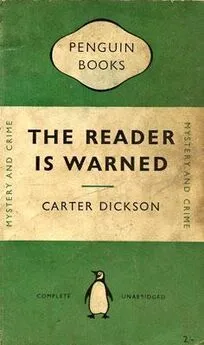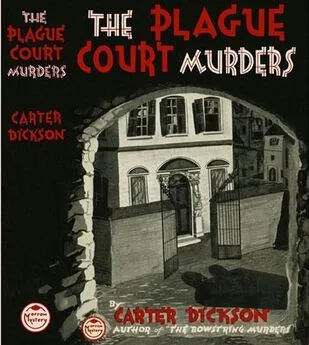John Carr - The Reader Is Warned
- Название:The Reader Is Warned
- Автор:
- Жанр:
- Издательство:неизвестно
- Год:неизвестен
- ISBN:нет данных
- Рейтинг:
- Избранное:Добавить в избранное
-
Отзывы:
-
Ваша оценка:
John Carr - The Reader Is Warned краткое содержание
Another of Carr's mysteries with a strong gothic touch, this one involving a psychic.
_________________
The Reader Is Warned - читать онлайн бесплатно полную версию (весь текст целиком)
Интервал:
Закладка:
It was remarkable how the jury seemed to come together like a Rugby scrum, and then fold apart again to present a united front. It was at this minute that somebody stuck a flash-bulb and camera against one of the windows r the light glared out into the room, showing Pennik between his two escorts. The foreman, already red in the face, was on his feet. He held a piece of paper, which he contemplated with a scowling brow.
'Mr Coroner.'
'Yes, yes? One moment!'.
This time, outside the windows, there was a, genuine police charge. The legs scattered. As though his wits scattered too, the foreman looked up over his shoulder. Then he settled himself again, grimly.
'Mr Coroner,' he said, 'before we give you our verdict, can I ask a question?'
'Yes, yes, of course, if you really think it is necessary. What did you wish to know?'
'Mr Coroner, are you bound to accept whatever verdict we give you, now?'
'Of course.'
'Well, some of us weren't properly sure,-' persisted the foreman. 'Laws being what they are, with the brewers and all. Is there a kind of judge, or court of appeal, or something like that, that can take back our verdict and say it's n.b.g.?'
'No, certainly not. And I see no reason for such terms or such language, Mr Foreman. This is not a court of law. It is an inquiry, and I must act as you direct. But surely -'
The foreman drew a deep breath, holding up a huge hand to forestall further comment.
'Ah, that's what I wanted to know.' He glanced at the paper in his other hand. 'We, the jury,' he roared from the depths of his throat, 'find that the deceased who came to its death was deliberately murdered by pennik, using a thing called Teleforce...'
The coroner was on his feet. Sanders never forgot the effect of it. In his evident legal agitation the coroner had forgotten the hanging lamp over the table. His forehead struck the edge of the thin white glass shade, which gave out a ringing note like a bell. He reached up to steady the wildly swinging cord of the lamp as he spoke.
'Gentlemen, please, one moment!'
'Told you 'e wouldn't like it, Ted,' said a voice.
'I cannot interfere with your verdict, of course. I have no wish to do so. You are the judges of the facts, not I. But before your verdict is recorded let me beg of you to stop and consider. - You are asking me to commit Mr Pennik for trial on a charge of murder?'
'Yes, Mr Coroner, we are.'
'But do you realize that such a trial would be a farce?
Do you realize that they could not possibly convict him?'
The little red-headed juror stuck out his neck.
"Then they ought to be ashamed of themselves,' he said. 'If a murderer is going to be allowed to run around loose, what's to become of any of us? We don't care what the doctors say. It's in all the papers; all of 'em; and if it's in all the papers it's not politics: it's true. It was even in the Daily Wireless; that ought to be conservative enough for you; interview with a big pot named Sir Henry Somebody. If they can't convict him that's their business, and more shame to 'em; but at least we've done our bit.'
"At's telling him, Charley,' said the approving voice.
'But, gentlemen, for the last time let me implore you to stop and consider! Have you considered, for one thing, how much a trial for murder costs the taxpayers?'
"Ow much?' asked the approving voice, with quick interest.
'Well, that is hardly germane to our inquiry -' 'Ah, but you said it was,' the approving voice pointed out.
'If you press me, I believe it costs about five thousand pounds.' 'five thousand pounds?'
'Yes, gentlemen, about that. Now, come! Does not that consideration weigh with you in the least?' The foreman's brow darkened.
'Yes, it thundering well does,' he said. 'If they can throw money down the drain like they do on the things they do, why, I say, they can thundering well spend a little bit of it on upholding the laws of this country. There was a gentle-man in my bar-parlour last night - stout gentleman, very pleasant-spoken - said exactly that. If they can throw -'
The coroner bowed his head.
'We need not carry the discussion any further, gentlemen. I am ready to hear your verdict.' He listened gravely while it was read again. Sanders was watching his face. Sanders did not dare look
at either H. M., or at Masters, or at Pennik sitting between them. The coroner's pale, dry face was very close to the white lamp; and on it Sanders could have sworn he saw, very briefly, the faint turn of a smile.
'Thank you, Mr Foreman. - Is the police-officer in charge of this case in court?'
At the back of the long, dim room, Masters got to his feet.
'Ah, Chief Inspector? By virtue of the authority invested in me, I must instruct you to apprehend ...'
'He's here, sir,' replied Masters, putting his hand on Pennik's shoulder. 'Get up, Mr Pennik. Walk forward and see the coroner.'
The jury were on their feet. Sanders did not see Pennik's face and he did not want to see it. He remembered as a grotesque touch that Masters, with one hand on Pennik's arm, was carrying in his other hand Pennik's new and shining suitcase. The windows were now entirely darkened by police legs.
'Mr Herman Pennik ?' asked the coroner..
Pennik merely bowed.
'I am afraid, Mr Pennik, that I must commit you for trial. Chief Inspector Masters will tell you that you need not say anything at this time, but that, if you do, it will be taken down in writing and may be used as evidence. 1 further -'
Pennik spoke very clearly. 'Mr Coroner, I am not certain whether to be amused or annoyed. This situation is fantastic. You have said yourself that the trial will be a farce.'
'I quite agree. If you have, contrary to my instructions, been present at this inquest,' the coroner told him in a curious tone, 'you will be aware that I could not have given your case fairer treatment had I been briefed in your defence. But I have no alternative.'
'It is unreasonable; it is not justice. Still, if you insist, I must give in with as good a grace as I may. I am willing to stand my trial whenever you think it is necessary. You know where to find me. In the meantime, however, I have a very important mission to undertake: a visit to Paris. I will, of course, give bond for my reappearance. But if you will excuse me now -'
Two police constables moved out and stood in front of the door.
The coroner shook his head.
'I fear, Mr Pennik,' he said grimly, 'that it is not quite so simple as all that. You will not go to Paris or anywhere else. You will be committed to gaol pending your trial; and that will be the limit of your activities for the present.'
It was perhaps three seconds before Pennik spoke. Sanders saw his shoulders seem to broaden under the festive top-coat.
'You do not mean - you cannot mean I shall be under restraint? Locked up? Not in a cell?'
'Naturally. That is the customary proceeding. You cannot expect to be treated any better or any worse than others who are committed to trial for murder.'
'But I cannot be convicted,' said Pennik, with a desperate reasonableness. 'I am quite safe. You tell me that in so many words. It is raving lunacy to lock up a man who cannot be convicted. Because a parcel of thick-witted yokels choose to make a decision at variance with all law or sense ...'
'What's that you're giving us?' demanded the foreman of the jury, jumping down from the dais.
The coroner turned swiftly.
'Gentlemen of the jury, before you leave for your homes would you be good enough to file into that room (there) by that door? I should like to say a few words before you disperse. Please do pot argue the matter, but oblige me by going at once. I shall not detain you long ... Mr Pennik, I cannot argue the matter with you any further. Chief Inspector, I leave the prisoner in your charge.'
Pennik's voice rose. ' 'But when is this trial? How long am I to be kept under restraint?'
'I cannot tell you that exactly. This is the beginning of May. You will probably come up for trial at the Kingston Assizes some time late in July. I obviously cannot give you any information more exact than that.'
'Three months?' 'Roughly, yes.'
Despite Pennik's heavy chest and shoulders, Sanders still would not have believed there was so much power in them. Pennik moved with such blinding swiftness that Masters's fingernails scratched vainly across the cloth of the top-coat, and missed their grip. It was a heavy table, an oak table; but Pennik had it into the air with one enormous heave, his hands on either side, and he would have brought it down on the coroner's face and head like the crash of a slab of stone if his ankle had not twisted under him. The table wavered, a weight in the sky; Masters had him round the waist and shoulders half a second later; the table wavered still more, and thudded to the floor as two more men fastened on Pennik.
The coroner, though he was white to the lips, merely touched his spectacles as though to make sure they were still on his nose.
'That will do, I think. - You have him, Chief Inspector?' 'Got him fast, sir.'
'I think it would be as well not to risk anything. After an outburst of that kind, you may use your own discretion as to the sort of cell to which Mr Pennik is confined. Mr Pennik, you have asked for the exact letter of the law; and that is what you are receiving. I notice that you appear to retch violently at a taste of your own medicine. Now, gentlemen of the jury, if you will kindly follow me... ?'
With a heavy shuffling of feet, the jury filed out, and the coroner shepherded them. Pennik was left alone with his other captors in the dark and darkening room. Sanders still could not see his face, but the gaiety of his tan top-coat and travelling cap were eloquent/.
Then Pennik spoke again.
'God in heaven,' he said, suddenly putting his knuckles at the corners of his eyes without turning round, you can't do this. It is monstrous. It is brutal. It is pure torture. Three months in a cell; three months locked up; three months to go mad in. I can't stand it. I demand the law.'
H. M. spoke very quietly. He had lumbered up with surprisingly little noise, and he was standing at the other side of Pennik. He took a chair from the front row and set it out.
'Sit down, son,' he said.
CHAPTER XVIII
Police-constable Leonard riddle, of C Division, had a beat along which, it is true, little in the way of violence or crime ever happened. And P.O. Riddle was content to have it so. ‘
He liked his beat, not only for the mingled life and quiet of it, but for the pleasurable feeling it gave him of having some acquaintance with the nobs, of being behind the scenes, of, unobtrusively, helping tend the lares and penates of an admirable house. His beat skirted Park Lane, took him along Mount Street to Berkeley Square, down round the curve of Curzon Street, and back to Park Lane again. Odd how much information you picked up about people, even when they never noticed you. You could tell how things were going; who went where; what the domestic troubles were; all of a good many who were aware of you only as something to say good night to. P.C. Riddle had his favourite people, as he had his favoured parts of the beat. Few of them he knew as names, though many chauffeurs were his friends. But many were ticketed in his mind as numbers, with some corresponding description, as a cloakroom attendant will ticket hordes by a catch-phrase and return the right hat without any slip of paper to identify it. Sometimes he felt fatherly and a trifle godlike. When someone in private life told him he was a student of human nature, he was pleased.
This term had even, in fact, been applied by one of his numbers. There was a night when number eleven D'Orsay Street (junior, not the old man) was coming home from a cocktail-party at three o'clock in the morning; and number eleven D'Orsay Street had draped himself over a pillar-box and insisted on talking first about astronomy and then about the perfidious nature of woman. Having just been given the raspberry by his fiancée, number eleven was in a philosophic mood. In the course of his remarks he had called P.C. Riddle a student of human nature: just as we all, when whiffled, like to think that the person we are talking to is as profound as we are. But he had always liked number eleven afterwards; it was one more reason why D'Orsay Street, a little cul-de-sac off Mount Street, was of interest to him.
Читать дальшеИнтервал:
Закладка:










